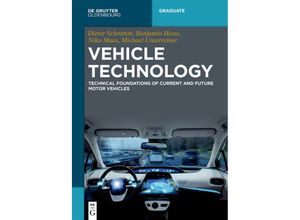The motor vehicle technology covered in this book has become in the more than 125 years of its
history in many aspects an extremely complex and in many areas of engineering science .Motor
vehicles must remain functional under harsh environmental conditions and extreme continuous
loads and must also be reliably brought into a safe state even in the event of a failure by a
few trained operators.The automobile is at the same time a mass product which must be produced
in millions of pieces and at extremely low cost. In addition to the fundamentals of current
vehicle systems the book also provides an overview of future developments such as for example
in the areas of electromobility alternative drives and driver assistance systems. The basis
for the book is a series of lectures on automotive engineering which has been offered by the
first-named author at the University of Duisburg-Essen for many years. Starting from classical
systems in the automobile the reader is given a systemic view of modern motor vehicles. In
addition to the pure basic function the modeling of individual (sub-) systems is also
discussed. This gives the reader a deep understanding of the underlying principles. In addition
the book with the given models provides a basis for the practical application in the area of
simulation technology and thus achieves a clear added value against books which merely explain
the function of a system without entering into the modeling.On the basis of today's vehicle
systems we will continue to look at current and future systems. In addition to the
state-of-the-art the reader is thus taught which topics are currently dominant in research and
which developments can be expected for the future. In particular a large number of practical
examples are provided directly from the vehicle industry. Especially for students of
vehicle-oriented study courses and lectures the book thus enables an optimal preparation for
possible future fields of activity.

